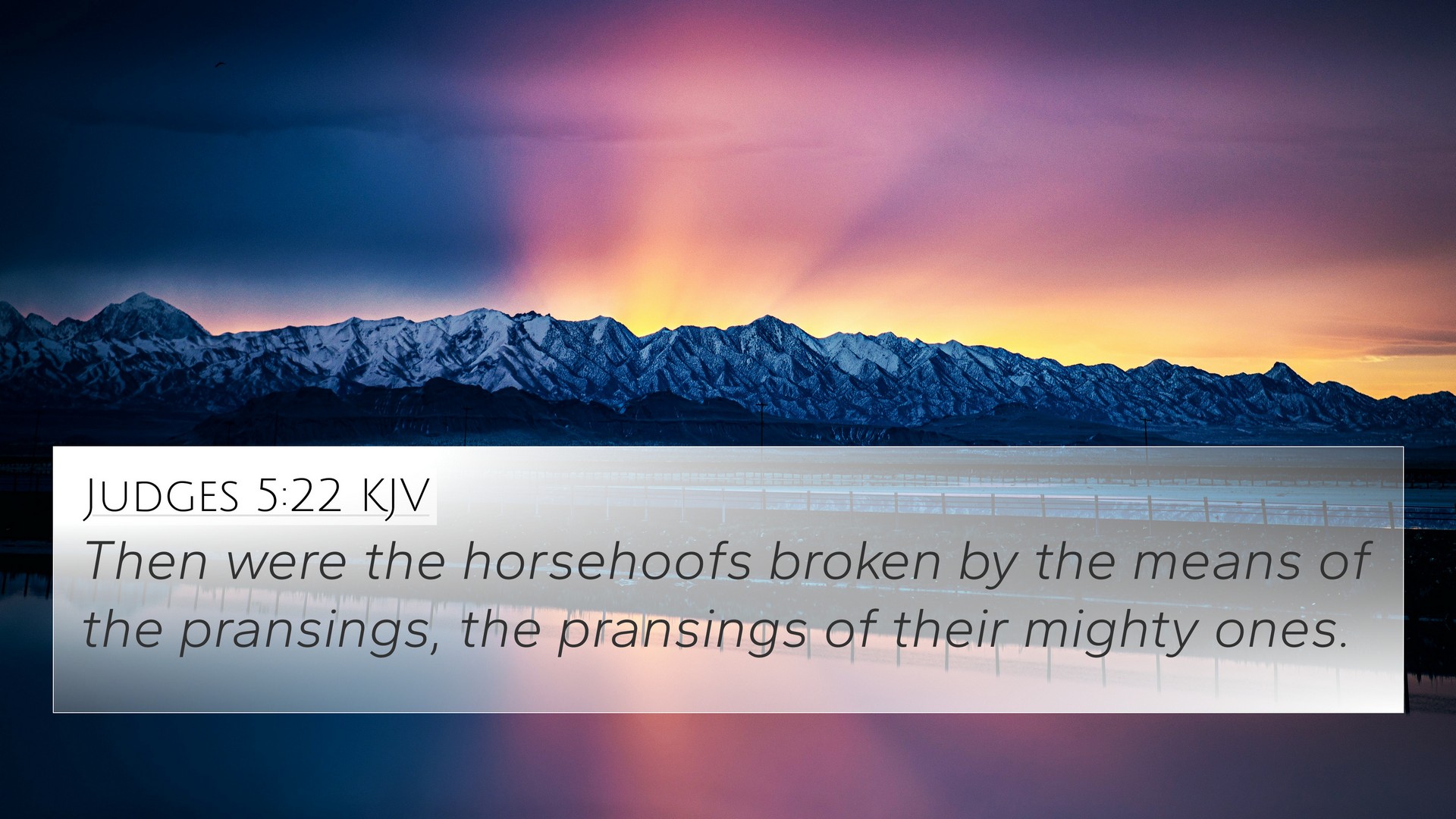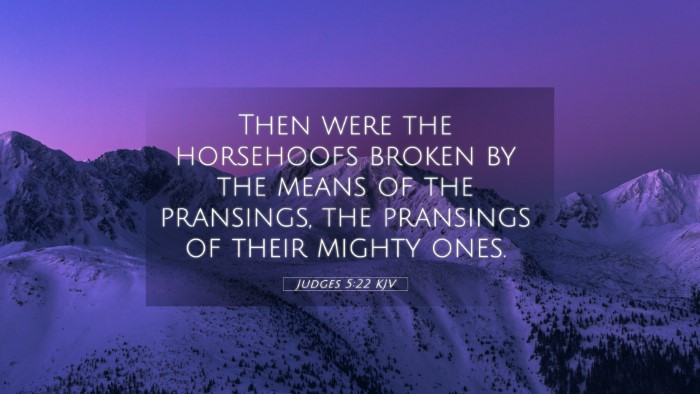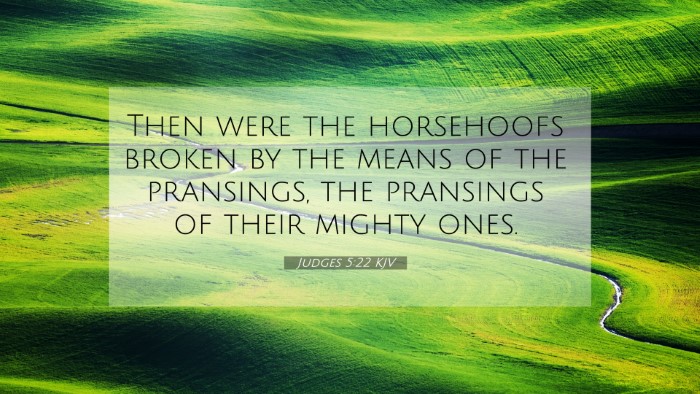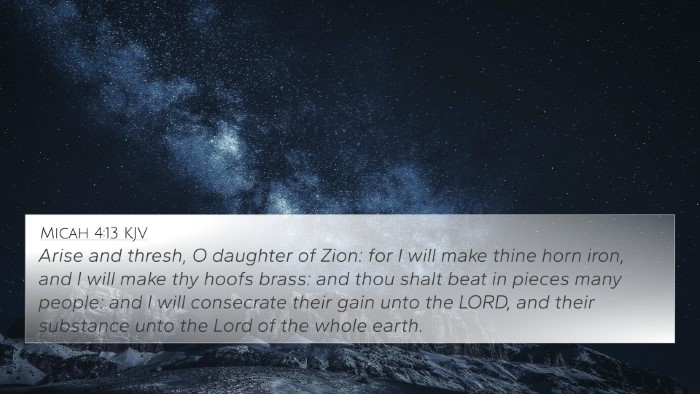Understanding Judges 5:22
Judges 5:22 states, "Then was the horse hoofs broken by the means of the pranching, the pranching of their mighty ones." This verse, part of Deborah's song, expresses the defeat of Sisera's army and the dramatic intervention by the Lord in aiding Israel. In this analysis, we will explore its significance through a combination of insights from renowned public domain commentaries, linking it to other relevant Scriptures to enhance understanding.
Commentary Insights
This verse draws imagery depicting the chaos and defeat faced by the enemies of Israel. The “horse hooves broken” symbolizes the disruption of Sisera's forces as God's intervention is likened to a mighty force that dismantles military strength:
-
Matthew Henry: Henry highlights the providence of God, noting how He brings confusion upon the mightiest of foes. The breaking of horse hooves signifies the crippling of a powerful army through divine intervention.
-
Albert Barnes: Barnes elaborates that the "pranching" denotes the intensifying fear of Sisera's warriors, leading to a panic that ultimately rendered them ineffective. He reflects on the importance of divine aid in achieving victory.
-
Adam Clarke: Clarke points to the geographical and historical context, understanding the 'horses' served as a pivotal aspect of the Near Eastern military. Their defeat represents not only physical but spiritual victory over oppression.
Inter-Biblical Connections
Understanding Judges 5:22 can greatly benefit from cross-referencing other Biblical texts. The following verses provide contextual layers illustrating themes of divine intervention, strength through weakness, and the downfall of oppressors:
- Psalms 68:1: "Let God arise, let his enemies be scattered." This mirrors the theme of victory over adversaries through divine power.
- 1 Samuel 2:10: "The adversaries of the Lord shall be broken to pieces." This reaffirms the idea of the Lord's might against those who rise against Him.
- Isaiah 41:15: "Behold, I will make you into a new threshing sledge with sharp teeth." This expresses how God empowers His followers against their foes.
- Exodus 14:14: "The Lord will fight for you, and you shall hold your peace." This emphasizes reliance on divine intervention, similar to Israel's experience in Judges.
- 2 Corinthians 12:9: "My grace is sufficient for you, for my strength is made perfect in weakness." This connects with the theme of achieving victory not through might but through reliance on God.
- Hebrews 11:33-34: "Who through faith conquered kingdoms, enforced justice." This reflects on the faith-driven victories of God's people, resonating with Deborah's song.
- Revelation 19:14: "And the armies in heaven followed him on white horses." This foreshadows ultimate triumph over evil, analogous to Sisera's defeat.
Comparative Bible Verse Analysis
By employing tools for cross-referencing, we can identify deeper insights regarding Judges 5:22. This analysis reveals both direct and thematic links between various Scriptures:
- 1 Chronicles 5:20: God intervenes in battles, enhancing the narrative of divine support.
- Romans 8:31: “If God is for us, who can be against us?” This verse resonates with Deborah's confidence in God's sovereignty amidst warfare.
- Joshua 10:11: The Lord intervenes with natural phenomena, akin to the chaos noted in Judges 5:22.
- Matthew 12:28: "But if I cast out demons by the Spirit of God, then the kingdom of God has come upon you," showing the authority God holds over evil similar to His power over Sisera.
Conclusion
Judges 5:22 serves as a powerful reminder of God's sovereignty and the assurance of victory for those who trust in Him. The intertwined themes of divine intervention, the breaking of earthly might, and the ultimate triumph of Israel are richly layered within Scripture. Through careful study and cross-referencing of Biblical texts, we gain a holistic view of how God operates throughout history — a promise that resonates through both the Old and New Testaments.
Further Study and Reflection
For those engaging in deeper study, consider using a Bible concordance for cross-referencing Biblical texts. This practice enhances understanding of both the selected verse and overarching themes in Scripture. Explore Bible cross-reference guides to navigate connections and deepen your theological insights.








